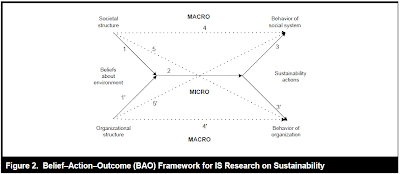There is the viewpoint that sustainability issues can be prioritized into three categories: generic, value chain, and competitive context (Porter and Kramer 2006). For example,the competitive context calls for a proactive strategic approach and may offer opportunities to illustrate the transformative powerof IS.
References:
-- Porter, M., and Kramer, M. 2006. “Strategy and Society: The Link Between Competitive Advantage and Corporate Social Responsibility,” Harvard Business Review (84:12), pp. 78-92.
-- Malhotra, A., Melville, N. P., Watson, R. T. 2010. "Call for Papers, MISQ Special Issue on Information Systems and Environmental Sustainability."


